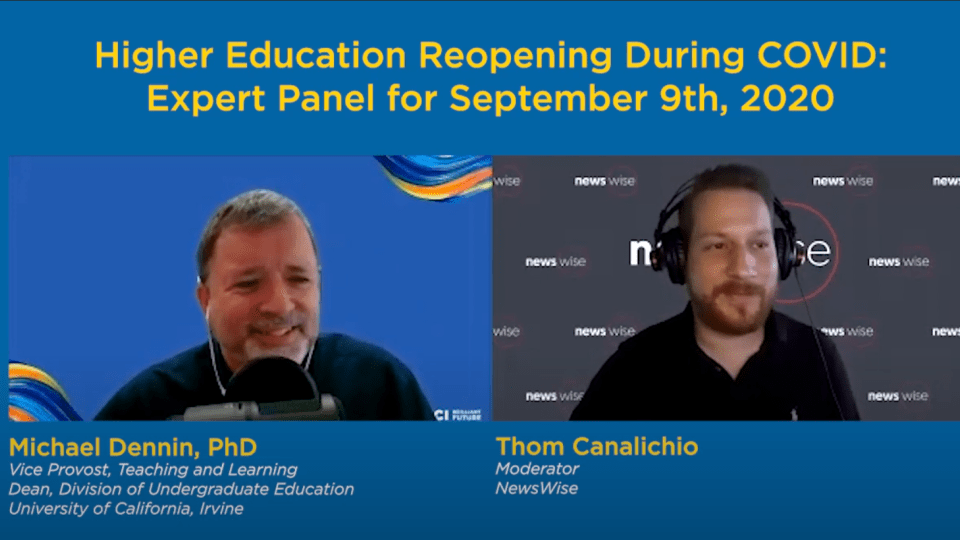On September 9th, University of California, Irvine (UCI) Vice Provost for Teaching and Learning and Dean of the Division of Undergraduate Education Michael Dennin joined higher education experts from across the country to participate in a virtual press conference with reporters from across the country hosted by Newswise. Discussing the topic “Higher Education Reopening During COVID,” Michael answered pressing questions about what UCI is doing to keep students and the community safe while maintaining the high educational standards that students expect.
When asked about UCI’s plans for Fall, Michael emphasized the importance of making decisions early so students had the ability to adjust and make the necessary arrangements. UCI officially announced back in June that it would go fully remote for Fall Quarter 2020. He added that given the unpredictability of the pandemic, UCI needed to offer flexible learning options for students who would be unable to come to campus when in-person instruction resumed. To ensure that students do not encounter interruptions to their academic plans, UCI will continue to offer remote learning options through the entire 2020-2021 academic year.
One of the major questions that the university faced was what to do about student housing. Identifying housing as a “critical resource” for many students, Michael explained that the university decided to convert campus residences into single rooms. To maintain appropriate social distancing in the dorms, students will be divided into small groups called “Zot Pods,” where they will remain sequestered for up to two weeks after their arrival at UCI. The Zot Pods allow students to interact socially while simultaneously ensuring the containment of possible COVID outbreaks.
As students start to move into housing ahead of Fall Quarter’s October 1st start date, UCI has begun an extensive COVID testing program. Michael noted that because UCI runs on the quarter system, it has the advantage of starting later in the year. This extra time has allowed the university to gradually ramp up testing capacity. Michael also explained that UCI has the benefit of a medical school, health system, college of health sciences, hospital and research labs that can all be converted into test processing sites once demand increases.
When asked how COVID has exposed the socio-economic disparities within UCI’s diverse student body, Michael identified two major challenges: many students don’t have access to stable internet connections, and others don’t have the technological resources required for remote courses. To address these obstacles, UCI ramped up its efforts to distribute WiFi hotspots to students facing connectivity issues and offered free laptop loans to students who may not meet the minimum technical requirements necessary for their classes.
While ensuring that students can access their online courses was and continues to be a challenge, Michael said that the remote teaching aspect is less of a concern. Not only had faculty learned a lot during the transition to remote teaching in Spring; many had also adjusted to remote instruction as they taught during Summer Session. Moving into Fall, Michael explained that he is confident in UCI’s preparation to offer excellent remote teaching.
If there is a silver lining to the pandemic, it offers a great opportunity for faculty to evaluate their teaching and challenge themselves to adapt and create new spaces for student engagement. Michael is excited that faculty are being introduced to new technology and teaching strategies that they can utilize in the future. Though the current circumstances are less than ideal, Michael expressed his belief that “there really is this massive moment of reflection on teaching that I think is going to transform what universities look like as we come out the other side.”
To hear all of Michael’s insights on UCI’s preparation for the 2020-2021 academic year, watch his full 11-minute segment here. To learn what other colleges and universities are planning this Fall, watch the full Newswise panel here.


